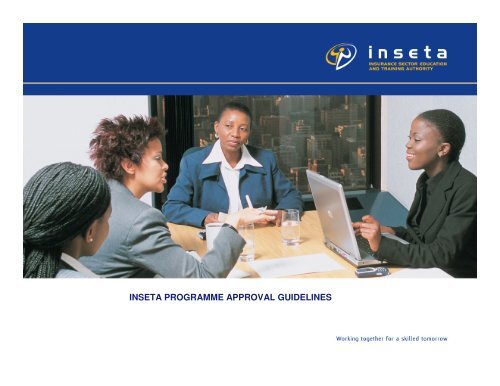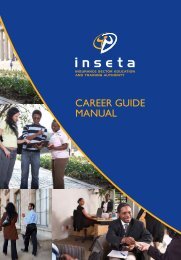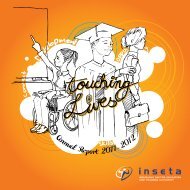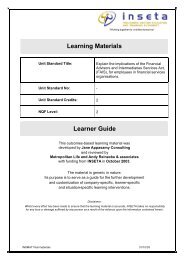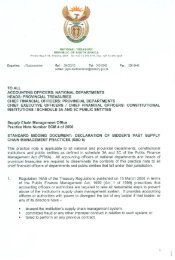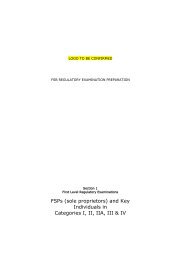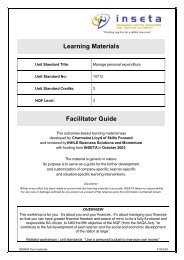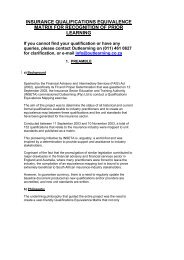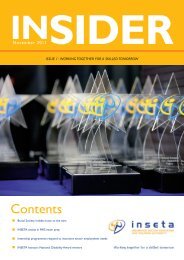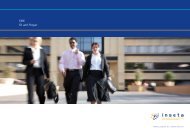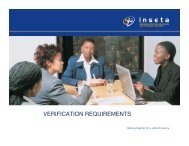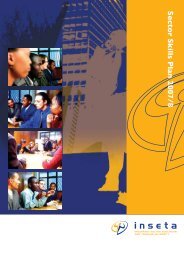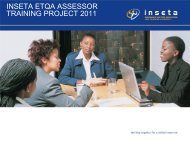INSETA PROGRAMME APPROVAL GUIDELINES
INSETA PROGRAMME APPROVAL GUIDELINES
INSETA PROGRAMME APPROVAL GUIDELINES
- No tags were found...
Create successful ePaper yourself
Turn your PDF publications into a flip-book with our unique Google optimized e-Paper software.
<strong>INSETA</strong> <strong>PROGRAMME</strong> <strong>APPROVAL</strong> <strong>GUIDELINES</strong>
Workshop ObjectivesThis workshop is targeted at Inseta accredited providers and registeredmoderators.Objectives:• Provide guidelines on the Inseta programme approval process• Moderation methods• Verification requirements• Obtaining suggestions to improve the <strong>INSETA</strong> Moderator Report.
Programme ApprovalGuidelines:•The purpose of programme approval is to ensure that a potential providermeets INSQA’S quality assurance criteria for training.•All training providers providing learning and assessments within INSQA’sscope need to adhere to the ETQA’s assessment and moderationguidelines.
Applying for Programme Approval1) Potential provider to contact INSQA department.2) The programme approval application form and guidelines will bemade available to the respective client.(New providers who are not familiar with the accreditation andprogramme approval process will be capacitated by INSQA beforeattempting to complete the application form.3) The provider to read over application form and guidelines in detail.4) Once the guidelines are understood, the provider will complete theapplication form and forward to INSQA it with all the necessarydocumentation for evaluation.5) Capacity Building from INSQA will be offered continuously throughoutthis process.
Programme Approval - Application FormRequirementsThe following sections in the application form need to be completed:Provider Contact DetailsDetails of scope requestedAssessor and Moderator Details ( Assessors and Moderators be Inseta registered constituentAssessors and Moderators)Facilitator Details ( Facilitators must be Inseta registered assessors)Moderator ReportLearning ProgrammeReassessments and Appeals Procedure/ PolicyResources, Market Penetration, Learning Assumed to be in place, Staff Changes,Application based learningIT Capacity and InfrastructureProvider DeclarationNB: Annexure 3 ( Qualifications / Course Matrix)
Application Form Requirements cont…Providers to also submit the following for evaluation:• Learner Guide• Facilitator Guide• Assessor Guide• Moderator Guide• Assessment Tools ( Formative and Summative Assessments)• Learning MaterialNB: Assessments and learning material need to be checked fortechnical accuracy and signed off by:• Inseta-registered Assessor/s,• Inseta-registered Moderator/s• and a Subject-Matter Expert/s
Moderator ReportThis report must be completed and signed off by an Inseta Registered ModeratorThe moderator must explain how the planned assessment methods and tools meetSAQA’S criteria of good and fair assessments ie.Appropriate - suited to the outcome being assessedFair - the assessment method does not present anybarriers to achievementManageable - the methods planned, make for easily-arranged andcost- effective assessments that do not undulyinterfere with learning.Integrated with workOr Learning - evidence collection is integrated into the work orlearning process where appropriate and feasible
Moderator Report cont..• The assessment tools are appropriately aligned to cover theory, application andcritical cross-field outcomes• Technical content is accurate and current and signed-off by a subject-matter expert• Assessments are aligned to the principles of good and fair assessments as laiddown by SAQA• The assessor/s are qualified to assess the content covered
AssessmentsIInseta requires learners to undergo both Formative and Summative AssessmentsFormative Assessments:• Conducted during the learning programme .• Are developmental in nature and prepare the learner for the summative assessment.• Identify areas of learning where the learner may be experiencing difficulties.• A learner who has not been deemed competent during the formative assessmentprocess may not proceed to take the summative assessment .Summative Assessments:• Undertaken at the end of a learning progamme• Must be Closed book ( ie. No use of learner notes)• Use of reference material such as a policy documents, formula tables etc. is permitted.• Must be supervised / invigilatedNB: Both forms of assessment need to be assessed and moderated and form part of thelearner’s POE which will be verified by the <strong>INSETA</strong> verifier at verification.
Assessment WeightingAssessment Breakdown• A rule of 60% formative assessment and 40% summative assessment has beenapplied.• A minimum formative mark ( ie 50 %) should be achieved before the learner isallowed to undergo the summative assessment .• Refer to INSQA’s assessment and moderation guidelines.
Assessment Weighting ExampleExample:Total assessment marks for an entire skills programme equals to 300 marksDivide assessments as follows as per the Inseta Guidelines:• Formative Assessment {( 60/100 x 300) = 180 marks}• Summative Assessment {(40/100 x 300 )= 120 marks}
Formative Assessment Mark Allocation GuideFormative Assessment Mark Allocation ( Total is 180 marks) :Assessments 2:Group Assignment , 10% of assessment weighting{( 10/60 x 180 ) = 30 marks}Assessments 1 & 6 : On the job Evidence , 15% of assessment weighting{( 15/60 x 180 ) = 45 marks}Assessments 3 & 5: Written Short / Long Questions , 20% of assessment weighting{( 20/60 x 180 ) = 60marks}Assessment 4:Individual Research Assignment , 15% of assessment weighting{( 15/60 x 180 ) = 45 marks
RPL AssessmentsRPL ( Recognition of Prior Learning) can be defined as:“ The comparison of a learner’s previous learning and experience obtained,against the learning outcomes required for a specific qualification” (SAQA Act58 of 1995).• RPL Assessment is fundamentally the same as other assessments, the onlydifference being that the learner will not need to go through a learningprogramme• A learner seeking credits through RPL, still has to comply with all therequirements as stated in the unit standard and will be assessed to determinecompetence.• The learner will have to provide the necessary evidence as required by thelearning outcomes and assessment criteria.• An evidence facilitator should be available to assist learners in compiling theirportfolios.• Assessment of RPL evidence is acceptable for formative learning but learnerswould still be required to take summative assessment/s to achieve thequalification.
Qualifications, Skills Programmes &LearnershipsDefinitions:QualificationPlanned combination of learning outcomes which have a defined purpose.Skills ProgrammeShort learning programme comprised of a cluster of unit standards. Allows forspecific skills training.INSQA requires providers to submit a skills programme for approval .A LearnershipA structured learning programme that consists of a theoretical and a practicalcomponent and leads to a qualification.
Qualifications - The Rules of CombinationBe aware of the following when designing material for a full qualification:• National Certificates levels 1- 4 = a minimum of 120 credits can be more.• Qualifications are made up of Fundamental, Core and Elective UnitStandards.Fundamental Unit standards – Unit standards that form the grounding forlearning ie Maths literacy , Language and communication .Please note : For some qualifications at NQF level 5 , the fundamentalsmay not be maths literacy, language or communication.Core Unit Standards – Unit standards which ensure the general purposesof the qualification are metElective Unit Standards – A selection of additional unit standards fromwhich a choice can be made by a learner to ensure that they achievespecific or specialist purpose.NB:Refer to the particular qualification and ensure that all fundamentals andcore and elective unit standards are covered as per the qualification rules.
NQF LevelsPresent NQF Levels for Qualifications:( * NQF may be subject to change to new 10 level NQF )NQF Level(*Present NQF Levels)5 – 8BandHigher Education and Training2- 41Further Education and Training( FET)General Education and Training ( GET)( Equivalent to Grade 9 and ABET level 4 )
Notional Hours of LearningWhen planning and designing a learning programme the notional hours oflearning must be taken into account. Notional hours can be defined as theaverage time a leaner would take to achieve the unit standard.• 1 credit = 10 notional hours of learning .• 4 credits would therefore = 40 notional hours of learning.• Suggestion : Also include a guide per formative assessment to guide learnerson how much time should be spent on each formative assessment activity aswell as on studying the learning material i.e. 3hrs study time per night.• This type of guide is very useful as some learners may not have been exposedto study methods or time management techniques• A study guide can be given and explained to learners at orientation.Proper planning leads to the better delivery of training.
Registration with the DOEIt is mandatory for providers to register with the Department of Education ifoffering full qualifications . This legal requirement is in addition to gettingaccreditation from INSQA.• Providers offering full qualifications from NQF levels 2- 4 need to register asprivate FET( Further Education and Training ) institutions .• Providers offering qualifications from NQF level 5 and above need to register asprivate HET ( Higher Education and Training) institutions.• Providers offering skills programmes ( unit standard clusters) do not need toregister with the Department of Education.• Providers compliance with this regulation will also be verified at verification.
CCFOs ( Critical Cross Field Outcomes)Before a full qualification can be awarded all CCFOs must be covered in:The delivery and assessment of the qualification, either in an integrated way, orseparately.For skills programmes, ensure that CCFOs per the unit standards making up theskills programme have been covered in the programmed.
Qualifications/ Course Matrix• Can be found as Annexure 3 of the programme approval application form.• Completion and the Submission of this matrix is compulsory.• The matrix is essential so that course material is correctly aligned and ensures thatall unit standard specific outcomes ,assessment criteria and CCFOs will be coveredduring the delivery of training.
Application Evaluation Process• All received applications received will initially be assessed through a desk topevaluation process which will be conducted by INSQA.• If the desk evaluation is satisfactory, a report will be compiled and the providerwill be informed in writing of this judgment .A site visit of will be scheduled bythe INSQA department.• If the desk review is unsatisfactory, a report will be compiled and the providerwill be informed in writing of this outcome. Applicants will be sent a reportdetailing areas of non conformance and improvement and the provider will beplaced on a development plan towards closing out all findings and will becapacitated by INSQA through this process.
Provider Site Visit• INSQA will conduct a site visit at the providers premises if the desktopevaluation is deemed satisfactory.• The site inspection will involve the following:- A physical inspection of all ( complete set) of learning material , assessmentguides, facilitator and learner guides.- The inspection of the facilities and personnel required as per accreditationrequirements as well as for the implementation of the learning programme.- A report on the outcome of the visit will be complied and forwarded to theapplicant provider.
Application Evaluation Process cont…• Should the site visit be favorable, a final report will be completed by INSQA.This report will detail recommendations as well the decision regarding theawarding of programme approval.• Should the site visit be unsatisfactory, the provider will be forwarded a sitevisit report and placed on a development plan to close out any identifiedfindings. The provider will be capacitated by INSQA through this process.• Successful applicants will receive a programme approval letter that will detailthe learning programme scope that they have been approved for.• All programme approvals remain provisional until at least one assessmentintervention is successfully delivered, verified and approved by INSQA.
Thank – youAny Questions ?


